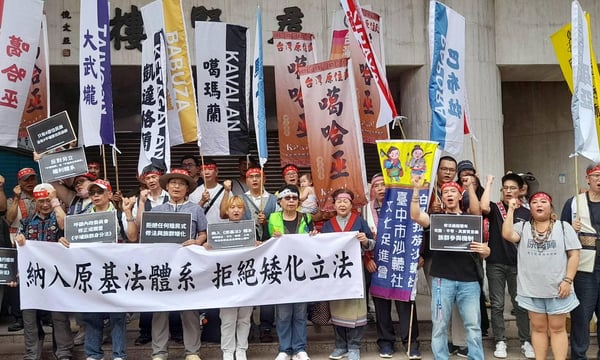China Power | Society | East Asia
A new law passed last week recognized Taiwan’s Pingpu peoples, reigniting debate over who gets to define indigeneity.
On October 17, 2025, Taiwan’s Legislative Yuan passed the Pingpu Indigenous Peoples Status Act, creating a new legal category within the country’s Indigenous framework.
The government celebrated the law as a historic milestone, framing this as an act of justice for groups long erased under colonial and state classifications. But many within Indigenous communities do not necessarily see it that way.
For some, the amendment represents long-awaited acknowledgment of the Pingpu Indigenous peoples, whose ancestral lands and identities were systematically erased through centuries of colonization. For others, it is a new form of state classification: one that once again defines indigeneity through bureaucratic recognition rather than community self-determination.
This law effectively adds a “third group” to Taiwan’s long-standing division between “mountains” and “plains” Indigenous peoples. That binary, first institutionalized under Japanese colonial rule and later perpetuated by the Republic of China (ROC) government, has shaped the politics of Indigenous recognition for decades. As I argued in a recent article for Taiwan Politics, such institutional frameworks constrain Indigenous self-determination by forcing communities into categories designed for governance, not for cultural or historical reality.
On social media platforms, the Central Taiwan Ping-Pu Indigenous Groups Youth Alliance (CTPIYA) hailed the law as a long-overdue recognition that restores visibility. As the law moves toward implementation, CTPIYA advocates have urged both the government and society to ensure that this recognition does not remain merely symbolic. The Pingpu Indigenous Peoples Status Act sets a five-year registration period (extendable for another five), but it must not become a bureaucratic obstacle course. Administrative inertia or technical barriers could easily prevent eligible Pingpu descendants from registering in time.
The government is also required to complete follow-up legislation within three years to secure political representation, healthcare access, and cultural and educational rights. Without these concrete guarantees, recognition risks being little more than a declaration. Equally important, the composition and procedures of the review committee must be transparent, with meaningful participation from Pingpu representatives themselves (rather than being dominated by external political or academic elites).
During the struggle for recognition, the Pingpu peoples have endured decades of neglect and suppression. The passage of this law, while hard-won, is only the beginning. Continuous public oversight will be essential to ensure that the Pingpu Indigenous Peoples Identity Act becomes not just another bureaucratic exercise, but a genuine step toward restoring the dignity and rights of Taiwan’s lowland Indigenous communities.
Meanwhile, elder activist Iban Nokan warned that “recognition” without genuine autonomy risks reproducing colonial dynamics under a new label.
Taiwan’s approach to Indigenous recognition reflects both progress and paradox. While it draws from global discourses of multiculturalism and rights, it remains deeply tied to bureaucratic structures. The act of adding the Pingpu peoples may fill a historical omission, yet it also reinforces the idea that Indigenous existence must still pass through the filter of state validation. The debate is about who holds the authority to define who counts as Indigenous in the first place.
As I wrote in a Taiwan Insight essay back in 2022, the recognition of “mixed-background” and Pingpu peoples highlights a recurring tension between visibility and autonomy. Visibility can bring rights, resources, and symbolic justice, but it can also freeze identity within the hierarchy of state-making.
The Pingpu Indigenous Peoples Status Act is both a milestone in acknowledging erased histories, and a mirror reflecting the limits of recognition politics in Taiwan. To move beyond the politics of classification, Taiwan must shift from asking “who qualifies” to asking “who decides.” True decolonization begins not when the state names its peoples, but when the peoples name themselves.






